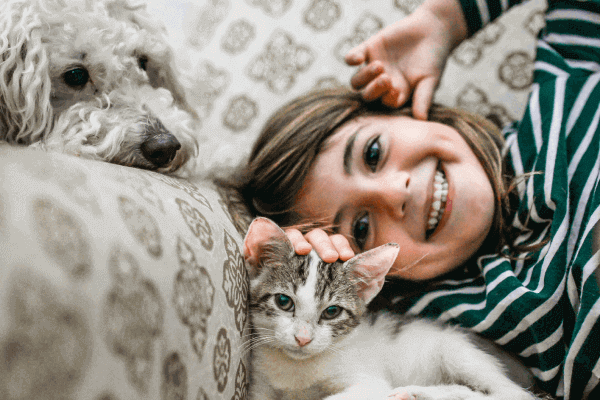Growing up with a pet can be a wonderful experience - endless games of fetch, cuddles on the couch and the cutest of family photos. But can having a pet also be good for children’s health? We explore the health benefits of having a dog or cat in the family.
Reducing the risk of childhood asthma and allergies
According to the ‘hygiene hypothesis,’ exposure to certain germs and infections early in life helps to develop children’s immune systems, and differentiates between harmful infections and allergens.1
More research is needed to confirm the theory, but investigations have found children who own a pet in the first year of life have reduced rates of allergies and childhood asthma, presumably because of their exposure to unique viruses, bacteria and parasites via their pets.2
In fact, a Swedish study published in 2018 found the more cats or dogs you have in the first year of life, the greater the effect. It found that 49% of children included in the study with no pets had ever had an allergic condition, compared with no allergic conditions for those with 5 or more pets.3
Strengthening immunity
Having a pet may also strengthen children’s immune response to other common illnesses and infections.
Interestingly, one study published in the Journal of Paediatrics found that infants who grew up around animals were less likely to suffer from infectious respiratory illnesses than those who didn’t.4 Babies who were exposed to pets, particularly dogs, during their first year were less likely to catch colds, experience ear infections and require antibiotics than those who had no pets.
Getting active
Having a pet – dogs in particular – gives us all one more reason to get out and get active. It’s hard to stay curled up on the couch when your furry friend is whining at the front door!
According to a UK study, dog owners are four times more likely to meet physical activity guidelines than non-dog owners. And children who owned dogs reported more minutes of walking and unstructured activity than those who didn’t.5

Teaching responsibility and empathy
Having a pet is a great opportunity to teach your child about responsibility and empathy from an early age.
Dogs and cats have pretty clear signals for when they are happy, hungry or upset. It’s a great way to start teaching your child how to read others’ feelings and adjust their behaviour accordingly. If only humans were so easy!
As they grow, taking on tasks like feeding, grooming and walking can also give your child a sense of responsibility.
Being mindful of pet safety and hygiene
There are lots of great benefits to having a dog or cat when your children are young, but there are some important things to keep in mind.
Younger children and pets require close supervision. Even the calmest dog or cat can bite or scratch if provoked or frightened. Children should never be left alone with pets, and should be taught from an early age how to be gentle with them.6
It’s also important to wash your and your child’s hands after patting your pet, or touching their toys, food bowls and bedding.
For cats, it’s important to keep children away from litter trays, or areas in the garden the cat uses for toileting.
With all the benefits your furry friend may bring, it’s only fair you look after them. Help protect your pet with Medibank Pet Insurance. Plus health members save 10%. Find out more.


